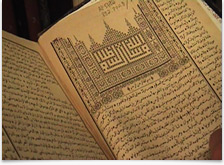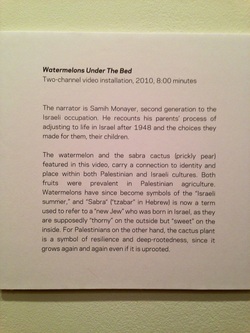 Watched this documentary 'The Great Book Robbery' on the 'Witness' program on ALJAZEERA English this afternoon. Incidentally, it will also be screened at Mosaic Rooms in London on May 15. 'The Great Book Robbery' was produced and directed by Benny Brunner, 2911 Foundation, and Xela Films in association with Aljazeera English.
0 Comments
 Last week I went to see the artist Dor Guez's exhibition held at London's Mosaic Rooms. This is the first UK solo show by the artist who is both Christian Palestinian and Jewish Tunisian. Part of Mosaic Rooms' cultural project 'Disappearing Cities', the exhibition aims to bring to the forefront the experiences of the Christian Palestinian minority who remained in the State of Israel after the 1948 war. Guez addresses the impact this decision has had not only on the generation that lived through it but also on the subsequent generations who continue to live there. A minority that finds itself marginalised by the narratives of the region. This is a very small exhibit consisting of two video installations ('40 Days' & 'Watermelons Under the Bed') in addition to several showcase tables displaying Palestinian Identity Cards and passports dating back to the British Mandate (1920-1948) and belonging to three generations of the Monayer family who are relatives of the artist himself. Hanging on the walls are a number of 'scanograms' (scanned archival images) from Guez's family album. To see a sample of these and to view the artist's work click HERE. The video installation '40 Days' - the family's mourning period when a loved one dies - is a 15-minute two-channel video installation about the destroyed grave sites in the Christian Palestinian cemetery in the city of Lod. Tombstones charred and desecrated (a skull is visible in one photo) and where once there must have been a metal cross, the family have painted one on with black paint due to theft that is rampant in the area. The cemetery is unkempt exuding neglect and abandonment mirroring much of how the Christian community in the area feel. A people with little say in what happens politically in the volatile area around them - quite simply 'a minority within a minority' - trying to get by as best they can given the predicaments they are faced with. The installation I found the more powerful was the video 'Watermelons Under the Bed'. In a mere eight minutes the artist manages to summarise what this whole exhibition is about: Personal identity and how to define it in a land rife with turmoil. An explanatory sign at the entrance to the room explains that 'the narrator in the video is Samih Monayer, second generation to the Israeli Occupation who recounts how his family had to adjust to their new life and how this has reflected on who he is today and how it has impacted on his own children as well'. A clip on YouTube, not shown at the exhibit, properly explains how the Monayer family view themselves and their situation. Click HERE to view. 'Watermelons Under the Bed', at first glance, seems a candid way for the Monayer family to talk about the family history. But on second and third viewing, you hear and notice other things: the voice of Samih's female relative (who we hear but do not see) instructing him not to speak of politics lest he jeopardise his job, Samih himself recalling his childhood unease when briefly attending the nearby Arab school and Samih's grandfather whose mood fluctuates between candid defiance and despondent resignation. Nobody is fully at ease and they all continually pause to think of what they are going to say next and how they are going to say it. This is a family who is the direct product of a conflict that carves its mark day after day and year after year on every Palestinian family's history and personal identity. It would be interesting to know how the Palestinian Christians will judge these videos. Will they see it as one Christian family's attempt to justify the life they have chosen for themselves in Israel or will they take offence that the Monayer family should presume that all Christian Palestinians share their view? Another question that poses itself is should the Christian Palestinians have to explain themselves in the first place? Exhibitions such as this one, although riddled with connotations, are important. In my opinion they serve as a reminder that time waits for no man and whether or not a permanent resolution to end the Israeli Palestinian conflict is near or far, we are forced to acknowledge the influence Israel's presence has already had on Palestinian ideas of history, culture and a collective identity. In the end, like it or not, we are all a product of the environment we live in. Dor Guez is the founder of the ongoing project The Christian Palestinian Archive which according to the artist's post on ArtSpace relies on photographs and documents to "research and document the diasporic community of Christian Palestinians living throughout the Middle East." On another front, June 2012 saw the laying of the cornerstone for the "Palestinian Museum" in Birzeit, a museum which according to its website is 'dedicated to the exploration and understanding of the culture, history and society of Palestine and the Palestinian people'. It will be interesting to see whether projects undertaken by artists such as Guez will be considered and whether future collective work collaborations will be possible once the museum opens in 2014. Share your opinion with me: If you've been to the exhibition, what did you make of it? If you haven't been, you can still do so as the exhibition continues until the end of May. However, for those of you NOT in London, you can click below to view the video "Watermelons Under the Bed' that has been posted on YouTube and maybe let me know what you think? |

 RSS Feed
RSS Feed
